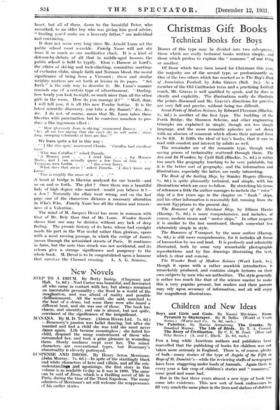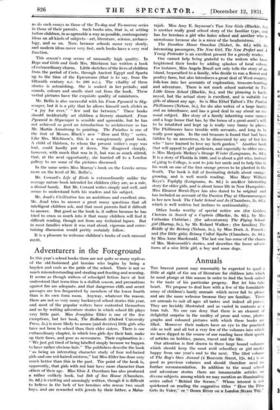Children and New Ideas The Paintbox. By Martin Armstrong. The
Greeks. By Rosalind Murray. The Life of Birds. By T. A. Coward. The Story of tivilization. By C. E. M. Joad. (How and Why Series.) (A. and C. Black. 2s. (id. each.) Foa a long while American authors and publishers have marvelled that the publishing of books for children was not taken more seriously in England. There is, of course, plenty of bulk—many stories of the type of Angela of the Fifth or Boys of St. Dominic's—while the reviewing staffs of newspapers have been staggering under loads of Annuals. Again there is every year a fair crop of children's stories and " romances," some good and some bad.
But in the last three years almost a new type of book has come into existence. This new sort of book endeavours to fill very much the same place in the lives and shelves of children as do such essays as those of the To-day and To-morrow series in those of their parents. Such books aim, that is, at setting before children, in as agreeable a way as possible, contemporary ideas on all kinds of subjects—art, literature, science, archaeo- logy, and so on. Now, because schools move very slowly, and modern ideas move very fast, such books have a very real function.
This season's crop seems of unusually high quality. In Boys and Girls and Gods Mrs. Mitchison has written a book of extraordinary charm. Little sketches of the lives of children from the period of Crete, through Ancient Egypt and Sparta up to the time of the Epicureans (that is to say, from the fifteenth century n.c. to 280 a-c.). The vitality of these stories is astonishing. She is soaked in her periods; and sounds, colours and smells start out from the book. These verbal pictures have the exquisite quality of miniatures.
Mr. Bellis is also successful with his From Pyramid to Sky- scraper, but it is a pity that he allows himself such cliches as " a joy for ever," " few and far between." These books should incidentally set children a literary standard. From Pyramid to Skyscraper is sensible and agreeable, but he has not achieved so good an introduction to architecture as has Mr. Martin Armstrong to painting. The Paintbox is one of the first of Messrs. Black's new " How and Why " series. Like Mrs. Mitchison's, this is a conspicuously good book. A child of thirteen, to whom the present writer's copy was lent, could hardly put it down. She disagreed sharply, however, with much that was in it, but was so much stirred, that, at the next opportunity, she hurried off to a London gallery to see some of the pictures discussed.
In the same series Miss Murray's book on the Greeks seems more on the level of Mr. Bellis's.
Mr. Coward's Life of Birds is extraordinarily unlike the average nature book intended for children (they are, as a rule, a dismal band). But Mr. Coward writes simply and well, and seems to understand both his readers and his subject.
Mr. Joad's Civilization has an ambitious and excellent aim. Mr. Joad tries to answer a great many questions that all intelligent children ask, and that most parents find it difficult to answer. But good as the book is, it suffers because he has tried to cram so much into it that many children will find it difficult reading, though not from any technical lapses. But in most families where it was read aloud, vigorous and enter- taining discussion would pretty certainly follow.
It is a pleasure to welcome children's books of such unusual merit.











































 Previous page
Previous page